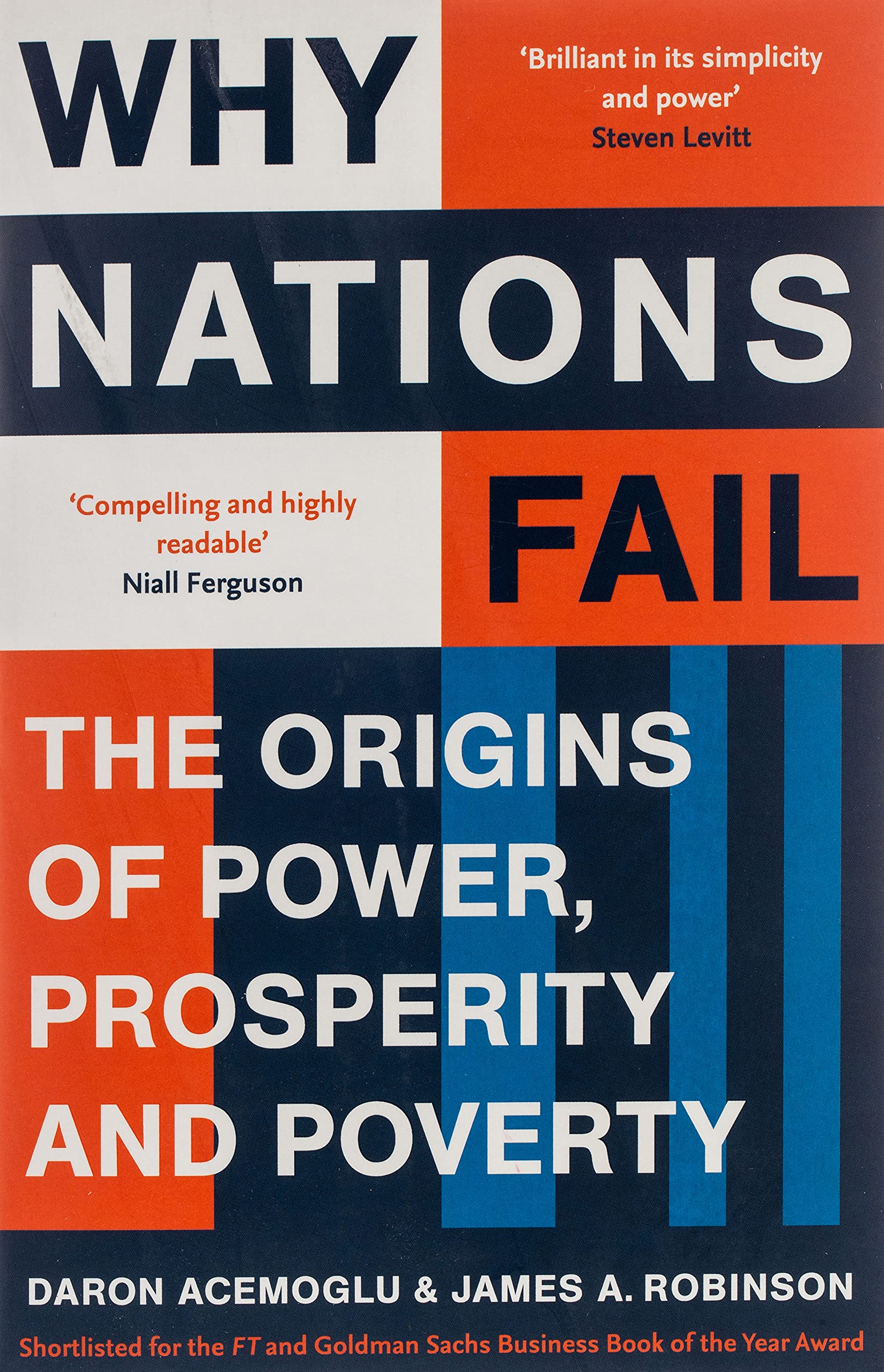صدر حديثًا
هذا الكتاب جديد وسيتم رفعه فور توفره لدينا وبعد الحصول على حقوق النشر اللازمة.

كتاب Why nations fail: the origins of power, prosperity and poverty PDF
(0)
المؤلف:
دارون أسيموغلوعدد القراءات:
78
اللغة:
الإنجليزية
الفئة:
علوم اجتماعيةالقسم:
الصفحات:
612
الجودة:
ممتاز
المشاهدات:
1147
اقتباس
مراجعة
حفظ
مشاركة
وصف الكتاب
Brilliant and engagingly written, Why Nations Fail answers the question that has stumped the experts for centuries: Why are some nations rich and others poor, divided by wealth and poverty, health and sickness, food and famine?
Is it culture, the weather, geography? Perhaps ignorance of what the right policies are?
Simply, no. None of these factors is either definitive or destiny. Otherwise, how to explain why Botswana has become one of the fastest growing countries in the world, while other African nations, such as Zimbabwe, the Congo, and Sierra Leone, are mired in poverty and violence?
Daron Acemoglu and James Robinson conclusively show that it is man-made political and economic institutions that underlie economic success (or lack of it). Korea, to take just one of their fascinating examples, is a remarkably homogeneous nation, yet the people of North Korea are among the poorest on earth while their brothers and sisters in South Korea are among the richest. The south forged a society that created incentives, rewarded innovation, and allowed everyone to participate in economic opportunities. The economic success thus spurred was sustained because the government became accountable and responsive to citizens and the great mass of people. Sadly, the people of the north have endured decades of famine, political repression, and very different economic institutions—with no end in sight. The differences between the Koreas is due to the politics that created these completely different institutional trajectories.
Based on fifteen years of original research Acemoglu and Robinson marshall extraordinary historical evidence from the Roman Empire, the Mayan city-states, medieval Venice, the Soviet Union, Latin America, England, Europe, the United States, and Africa to build a new theory of political economy with great relevance for the big questions of today, including:
- China has built an authoritarian growth machine. Will it continue to grow at such high speed and overwhelm the West?
- Are America’s best days behind it? Are we moving from a virtuous circle in which efforts by elites to aggrandize power are resisted to a vicious one that enriches and empowers a small minority?
- What is the most effective way to help move billions of people from the rut of poverty to prosperity? More
philanthropy from the wealthy nations of the West? Or learning the hard-won lessons of Acemoglu and Robinson’s breakthrough ideas on the interplay between inclusive political and economic institutions?
دارون أسيموغلو
كامير دارون أسيموغلو هو خبير اقتصادي أمريكي من أصل تركي درس في معهد ماساتشوستس للتكنولوجيا (MIT) منذ عام 1993. وهو حاليًا أستاذ الاقتصاد في إليزابيث وجيمس كيليان في معهد ماساتشوستس للتكنولوجيا. تم تعيينه أستاذًا في المعهد في عام 2019. ولد لأبوين أرمينيين في إسطنبول ، أكمل دارون درجة الماجستير ثم الدكتوراه في كلية لندن للاقتصاد (LSE) في 25. حاضر في LSE لمدة عام قبل الانضمام إلى معهد ماساتشوستس للتكنولوجيا. حصل على وسام جون بيتس كلارك في عام 2005. اشتهر دارون بعمله في الاقتصاد السياسي. قام بتأليف مئات الأوراق البحثية ، شارك في تأليف العديد منها زميليه القدامى سايمون جونسون وجيمس أ. روبنسون. مع روبنسون ، قام بتأليف الأصول الاقتصادية للديكتاتورية والديمقراطية (2006) ولماذا تفشل الأمم (2012). هذا الأخير ، وهو كتاب مؤثر حول الدور الذي تلعبه المؤسسات في تشكيل النتائج الاقتصادية للدول ، أثار تعليقات علمية وإعلامية واسعة. يوصف بأنه وسطي ، فهو يؤمن باقتصاد سوق منظم. يعلق بانتظام على القضايا السياسية ، وعدم المساواة الاقتصادية ، ومجموعة متنوعة من السياسات المحددة.
الكتاب غير متاح حاليًا
هذا الكتاب غير متاح حاليًا للنشر. لقد حصلنا عليه من بموجب ترخيص المشاع الإبداعي، ولكن المؤلف أو دار النشر لم يمنحا الإذن بنشره.
قيم الآن
5 نجوم
4 نجوم
3 نجوم
2 نجوم
1 نجوم
اقتباسات Why nations fail: the origins of power, prosperity and poverty
الأعلى تقييماً
الأحدث
اقتباس
كن أول من يترك اقتباسًا واكسب 10 نقاط
بدلاً من 3
التعليقات
كن أول من يترك تعليقًا واكسب 5 نقاط
بدلاً من 3